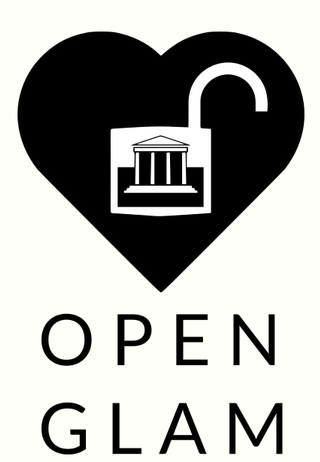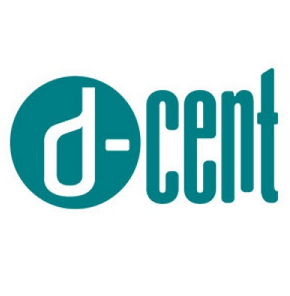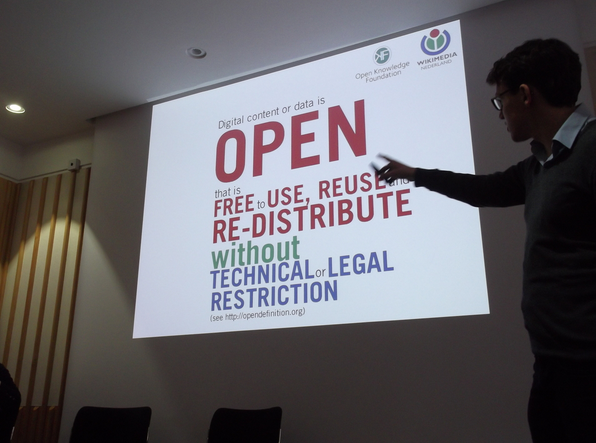
| Version | Summary | Created by | Modification | Content Size | Created at | Operation |
|---|---|---|---|---|---|---|
| 1 | Beatrix Zheng | -- | 1021 | 2022-11-24 01:42:17 |
Video Upload Options
Open Knowledge International (OKI) (known as the Open Knowledge Foundation (OKF) until April 2014, then Open Knowledge until May 2016) is a global non-profit network that promotes and shares information at no charge, including both content and data. It was founded by Rufus Pollock on 24 May 2004 in Cambridge, UK.
1. Aims
The aims of Open Knowledge International are:[3]
- Promoting the idea of open knowledge, both what it is, and why is it a good idea.
- Running open knowledge events, such as OKCon.
- Working on open knowledge projects, such as Open Economics or Open Shakespeare.
- Providing infrastructure, and potentially a home, for open knowledge projects, communities and resources. For example, the KnowledgeForge service and CKAN.
- Acting at UK, European and international levels on open knowledge issues.
2. People
In April 2015 Pavel Richter took on the role of CEO of Open Knowledge International. Pavel was formerly Executive Director of Wikimedia Deutschland. Pollock remains in a leadership role.[4]
The Open Knowledge International Advisory Council includes people from the areas of open access, open data, open content, open science, data visualization and digital rights. In 2015, it consisted of:[5]
- Andrew Stott
- Becky Hogge
- Benjamin Mako Hill
- Carolina Rossini
- Christopher Corbin
- Daniel Dietrich
- Denis Parfenov
- Peter Murray-Rust
- Sören Auer
- Glyn Moody
- Hannes Gassert
- Lynn M.Combs-Heard
- Jordan S. Hatcher
- Jo Walsh
- Mark Surman
- Mayo Fuster Morell
- Nat Torkington
- Pieter Colpaert
- Hans Rosling
- John Naughton
- Nigel Shadbolt
- Panagiotis Bamidis
- Peter Suber
- Yasodara Cordova
3. Network
As of 2018, Open Knowledge International has 11 official chapters and 38 groups in different countries.[6]
3.1. Chapters
- Austria
- Belgium
- Brazil
- Finland
- Germany
- Greece
- Ireland
- Japan
- Nepal
- Sweden
- Switzerland [7]
3.2. Local Groups
- Argentina
- Australia
- Bangladesh
- Bermuda
- Burkina Faso
- Cameroon
- Canada
- China
- Colombia
- Czech Republic
- Denmark
- Ecuador
- El Salvador
- Estonia
- Ethiopia
- France
- Guernsey
- Hong Kong
- India
- Italy
- Korea
- Macedonia
- Mexico - Instituto Internacional de Ciencia de Datos Mexico
- Nigeria
- Pakistan
- Panama - Ipandetec Panama
- Paraguay
- Philippines
- Portugal
- Russia
- Senegal
- Scotland
- Spain
- Taiwan
- Turkey - Dag Medya Turkey
- Ukraine
- United Kingdom
- United States
3.3. Working Groups
It also supports 19 working groups.
- Lobbying Transparency
- Open Access
- Open Bibliography
- Open Definition
- Open Design & Hardware
- Open Development
- Open Economics
- Open Education
- OpenGLAM
- Open Government Data
- Open Humanities
- Open Linguistics
- Open Product Data
- Open Science
- OpenSpending
- Open Sustainability
- Open Transport (project)
- Personal Data and Privacy
- Public Domain
4. Operations
Many of Open Knowledge International's projects are technical in nature. Its most prominent project, CKAN, is used by many of the world's governments to host open catalogues of data that their countries possess.[8]
The organisation tends to support its aims by hosting infrastructure for semi-independent projects to develop. This approach to organising was hinted as one of its earliest projects was a project management service called KnowledgeForge, which runs on the KForge platform. KnowledgeForge allows sectoral working groups to have space to manage projects related to open knowledge. More widely, the project infrastructure includes both technical and face-to-face aspects. The organisation hosts several dozen mailing lists[9] for virtual discussion, utilises IRC for real-time communications and also hosts events.
4.1. Advocacy
Open Knowledge International is an active partner with organisations working in similar areas, such as open educational resources.[10]
Open Knowledge International has produced the Open Knowledge Definition, an attempt to clarify some of the ambiguity surrounding the terminology of openness,[11] as well as the Open Software Service Definition.[12] It also supported the development of the Open Database License (ODbL).[13]
Outside of technology, Open Knowledge International plays a role in advocating for openness broadly. This includes supporting the drafting of reports, facilitating consultation[14][15] and producing guides.[16]
Rufus Pollock, one of Open Knowledge International's founders, and current board secretary sits on the UK government's Public Sector Transparency Board.[17]
4.2. Technical


The foundation places a strong interest in the use of open source technologies. Its software projects are hosted on GitHub, which utilises the Git version control software. Some of the projects are listed below:[18]
- CKAN, a tool that provides store for metadata. This enables governments to quickly and cheaply provide a catalogue of their data.[19]
- Datahub,[20] a community-run catalogue of useful sets of data on the Internet. Depending on the type of data (and its conditions of use), Datahub may also be able to store a copy of the data or host it in a database, and provide some basic visualisation tools.
- Open bibliography, broadly construed as efforts to catalogue and build tools for working with and publishing bibliographic resources,[21][22] with particular emphasis on those works that are in the public domain and public domain calculators. Examples include the Bibliographica,[23] Public Domain Works,[24] Open Shakespeare,[25] Open Text Book[26] and The Public Domain Review[27] projects.
- OpenGLAM,[28] an initiative that promotes free and open access to digital cultural heritage, held by GLAMs: Galleries, Libraries, Archives and Museums.[29] OpenGLAM is co-funded by the European Commission as part of the DM2E (Digitised Manuscripts to Europeana) project.[30]
- Open Economics[31]
- Open Knowledge Forums[32]
- Information Accessibility Initiative
- Open geodata[33]
- Guide to open data licensing
- "Get the Data" — a web-site for questions and answer on how to get data sets.
- POD - Product Open Data
4.3. Events
Much of the collaboration with other related organisations occurs via events that the foundation hosts.[34] Its premier event is the Open Knowledge Conference (OKCon), which has been held occasionally since 2007.[35] Other events have been organised within the areas of data visualisation[36] and free information network infrastructure.[37]
Annually, Open Knowledge International supports International Open Data Day
4.4. Panton Principles and Fellowships (Open Data in Science)
The Panton Principles (for Open Data in Science) in 2010 had large contributions from Open Knowledge people and in 2011 Jonathan Gray and Peter Murray-Rust successfully obtained funding from OSF for two fellowships, held by Sophie Kershaw[38] and Ross Mounce.[39] In 2013 OKF obtained sponsorship from CCIA[40] for 3 fellowships, which were awarded to Rosemarie Graves,[41] Sam Moore[42] and Peter Kraker.[43][44]
4.5. Other

Open Knowledge International also supports Apps for Europe,[45] and D-CENT, a European project created to share and organise data from seven countries, which is running from October 2013 to May 2016.[46] https://handwiki.org/wiki/index.php?curid=1725284
References
- GitHub Account Name jpekel (2011-06-17). "Joris Pekel | Extended Profiles | Open Knowledge Foundation". Okfn.org. Archived from the original on 13 November 2013. https://web.archive.org/web/20131113071007/http://okfn.org/members/jpekel/. Retrieved 2013-11-14.
- "GLAM-WIKI 2013/Schedule - Wikimedia UK". Uk.wikimedia.org. https://uk.wikimedia.org/wiki/GLAM-WIKI_2013/Schedule#S3B. Retrieved 2013-11-14.
- Open Knowledge Foundation. "About Us". http://okfn.org/about/.
- "Open Knowledge: Team". https://okfn.org/about/team/. Retrieved 31 October 2015.
- "Open Knowledge: Advisory Council". https://okfn.org/about/advisory-council/. Retrieved 31 October 2015.
- "Open Knowledge: The Global Network". https://okfn.org/network/. Retrieved 7 April 2018.
- "OKFN Network page". Open Knowledge International. https://okfn.org/network/.
- data.gov.uk. "Project Info: Who is Involved with the project?". HM Government. http://data.gov.uk/about/. "These include the Comprehensive Knowledge Archive Network (CKAN): CKAN stores the catalogue behind data.gov.uk and a growing number of open data registries around the world."
- Open Knowledge Foundation. "lists.okfn.org Mailing Lists". http://lists.okfn.org/mailman/listinfo. Retrieved 1 November 2015.
- Open Educational Resources Commons. "About". http://www.oercommons.org/about. Retrieved 1 November 2015. "Strategic Development and Outreach Partners ... Open Knowledge Foundation"
- "Open Definition". Open Definition. 2011-06-17. http://opendefinition.org/. Retrieved 1 November 2015.
- "Open Software Service Definition Launched". http://blog.okfn.org/2008/07/14/open-software-service-definition-launched/. Retrieved 1 November 2015.
- Creative Commons. "CC Salon Berlin and openeverything focus – Feb. 26". https://creativecommons.org/weblog/entry/12919. Retrieved 29 October 2015.
- Open Society Foundations (September 2010). "Public Feedback Solicited on Access to Information and Open Government Data". http://www.soros.org/initiatives/information/focus/communication/news/access-consultation-20100910. Retrieved 1 November 2015. "Information Program grantee Access Info Europe, together with the Open Knowledge Foundation, are holding a public consultation on open government data and the right of access to information."
- Electronic Frontier Foundation. "Digital Rights Management: A failure in the developed world, a danger to the developing world". https://www.eff.org/wp/digital-rights-management-failure-developed-world-danger-developing-world. Retrieved 1 November 2015.
- Dietrich, Daniel. "Open Data Manual". http://opendatamanual.org/. Retrieved 1 November 2015.
- data.govt.uk. "New Public Sector Transparency Board and Public Data Transparency Principles". HM Government. http://data.gov.uk/blog/new-public-sector-transparency-board-and-public-data-transparency-principles. Retrieved 1 November 2015.
- "projects - The Open Knowledge Foundation". http://www.okfn.org/projects. Retrieved 1 November 2015. Open Knowledge Projects
- "Feature Tour | ckan - The open source data portal software". http://ckan.org/features/. Retrieved 1 November 2015.
- "datahub.io". datahub.io. 2006-06-23. http://datahub.io/. Retrieved 1 November 2015.
- "Open Bibliography". JISC. http://www.jisc.ac.uk/whatwedo/programmes/inf11/jiscexpo/jiscopenbib.aspx. Retrieved 1 November 2015.
- "Open bibliography and Open Bibliographic Data | Open Bibliographic Data Working Group of the Open Knowledge Foundation". Openbiblio.net. http://openbiblio.net/. Retrieved 1 November 2015.
- "Open bibliography and Open Bibliographic Data". Bibliographica. 2010-05-20. http://bibliographica.org/. Retrieved 1 November 2015.
- "Home". Public Domain Works. http://publicdomainworks.net/. Retrieved 1 November 2015.
- "Open Shakespeare". Open Shakespeare. 2012-04-27. http://openshakespeare.org/. Retrieved 1 November 2015.
- "Open Text Book". Open Text Book. Archived from the original on 12 September 2015. https://web.archive.org/web/20150912064713/http://opentextbook.org/. Retrieved 1 November 2015.
- "ABOUT". The Public Domain Review. Open Knowledge Foundation. http://publicdomainreview.org/about/. Retrieved 1 November 2015.
- "The Open Definition - Open Definition - Defining Open in Open Data, Open Content and Open Knowledge". http://opendefinition.org. Retrieved 1 November 2015.
- http://okfn.org/get-involved/working-groups/
- "Workpackage 4: Community building". 31 January 2014. http://dm2e.eu/community-building/.
- "Open Economics". http://openeconomics.net. Retrieved 1 November 2015.
- "Open Knowledge Forums". https://discuss.okfn.org. Retrieved 1 November 2015.
- "Open Geodata Community | OSGeo.org". http://www.osgeo.org/geodata/community. Retrieved 1 November 2015.
- Holloway, Michael (March 2008). "PUBLIC SECTOR INFORMATION: OFFICIALLY BETTER WHEN SHARED". Digital Rights Group. http://www.openrightsgroup.org/blog/2008/public-sector-information-officially-better-when-shared. Retrieved 1 November 2015. "And if you get excited by material that's free to access, reuse or re-distribute, then please come down to tomorrow's OKCon, for a day of seminars and workshops around the theme of 'Applications, Tools and Services'."
- Open Knowledge Foundation. "About". http://okcon.org/about/. Retrieved 1 November 2015. "The Annual [sic] Open Knowledge Conference (OKCon)"
- Gehelenborg, Nils. "Workshop on Open Visualization". Nature Network. Archived from the original on 4 March 2016. https://web.archive.org/web/20160304023413/http://network.nature.com/groups/scivis/forum/topics/1498. Retrieved 1 November 2015.
- Doctorow, Cory. "Free Information Infrastructure event in London next weekend". http://www.boingboing.net/2005/09/26/free-information-inf.html. Retrieved 1 November 2015.
- "Sophie Kershaw | The Stilettoed Mathematician". Sophiekershaw.wordpress.com. http://sophiekershaw.wordpress.com/author/sophiekershaw/. Retrieved 1 November 2015.
- Mounce, Ross. "CV". Ross Mounce. http://rossmounce.co.uk/cv/. Retrieved 1 November 2015.
- "ccianet.org". ccianet.org. http://www.ccianet.org/. Retrieved 1 November 2015.
- "Rosie Graves - University of Leicester". http://www2.le.ac.uk/departments/physics/research/eos/rosie-graves. Retrieved 1 November 2015.
- "scholarly skywritings". http://scholarlyskywritings.wordpress.com/. Retrieved 1 November 2015.
- "Science and the Web". http://science20.wordpress.com/. Retrieved 1 November 2015.
- "Panton Principles: Panton Fellowships". http://pantonprinciples.org/panton-fellowships/. Retrieved 1 November 2015.
- "Apps for Europe | turning data into business". http://www.appsforeurope.eu. Retrieved 29 October 2015.
- "D-CENT". http://dcentproject.eu. Retrieved 29 October 2015.





